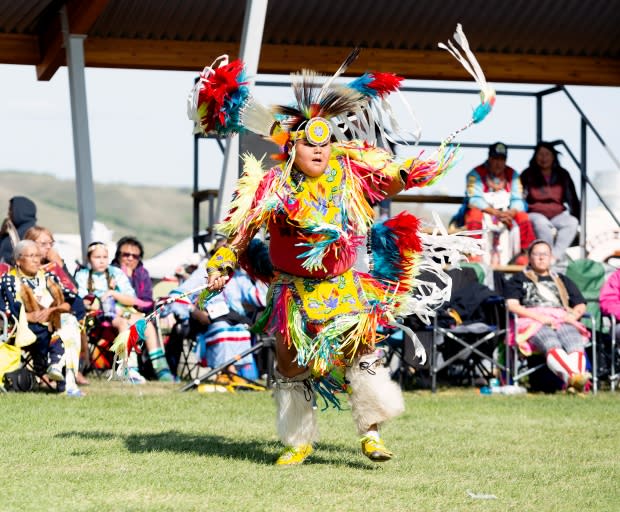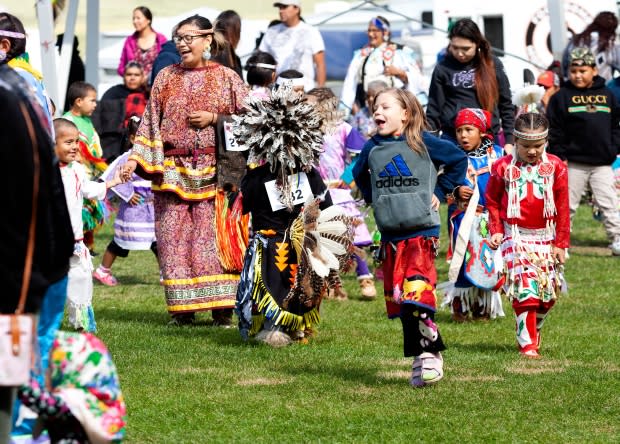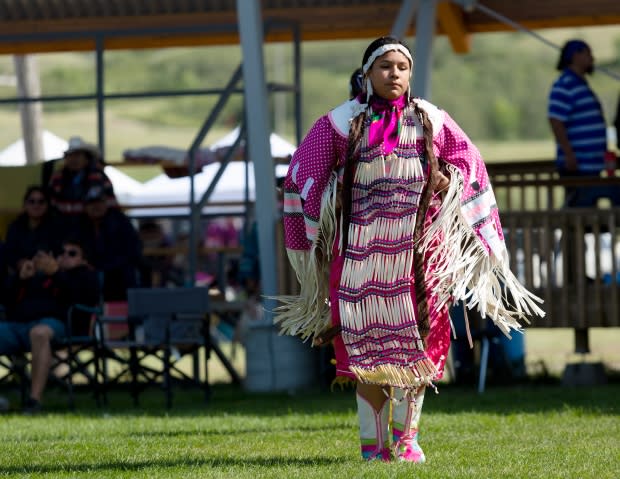Traditional powwows offer change of pace for singers, dancers, communities
The sound of drums thundered through the Qu'appelle valley on Saturday, as dancers and singers from around Saskatchewan attended the traditional powwow in Piapot.
Traditional powwows operate at a slower pace according to a singer, a dancer and a chief who attended the Piapot Traditional Powwow, hosted on Saturday and Sunday in the Piapot Cree Nation.
For Olivia Eyahpaise, from the Beardy's and Okemasis Cree Nation north of Saskatoon, the powwow trail in 2019 has taken her to traditional powwows exclusively.
"Competition hasn't really been a real big thing for me," Eyahpaise said.
"I just started dancing again this year so I wanted to take it slow, and I wanted to relax, and you know, not have the rush of always being on the go."

She said the relaxed pace of traditional powwows is calming for her.
During powwows, dancers are paid. During traditional powwows every dancer is paid for honouring the arbour. During competition powwows the top three, or sometimes five dancers are given cash prizes.
Eyahpaise said the atmosphere at traditional powwows is different, something she attributed to the lack of competition for money.
She said she's also found she's meeting more and more family and extended family while she travels and attends traditional powwows around Saskatchewan.
"When I go to competition powwows I feel alone because no one else is there," Eyahpaise said. "I want that family vibe. It's good because I see some relatives I haven't seen since I was little."

For Smooth Style drummer and founder Ryan Daniels, from the One Arrow First Nation north of Saskatoon, drumming is a way of life.
Attending traditional powwows is a way he shows his love for what he does.
"Competing is just singing for money and I honestly don't believe in that. I want to sing for the people," Daniels said.

Daniels said although he started attending competitive powwows in 2016, and he loves every minute of it, but he said he makes a conscious decision to attend traditional powwows whenever he can.
"I love traditional powwows. It's the place to be at. It's more calming, more quiet, and you don't always have to worry about what's going on at your drum," he said.

Piapot Cree Nation Chief Jeremy Fourhorns said the powwow hosted in Piapot has been held for decades. Video footage from the powwow dated 1951 exists, and he said elders remember a time before then when the gathering was hosted.
In its time, there have been years where it was a competition powwow and other years where it's been a traditional powwow, and there isn't much difference between the two according to Fourhorns.
He said the community has supported the powwow regardless of it being traditional or competitive.

But hosting traditional powwows gives organizers more opportunities to be flexible with the schedule when needed.
"When you run a contest powwow it's very stringent. You're on a very strict schedule, and you don't have the flexibility, sometimes to do certain things that are important to the community."
He said as an example, on Saturday, Piapot's oldest resident Helen Nahnepowisk celebrated her birthday and was honoured in a small ceremony during the powwow.

Something like that might not be possible to do during a competition powwow.
"[A traditional powwow] allows us the flexibility to do things like that on short notice," he said. "It's hard to adjust your schedule without going late at night [at a competitive powwow.]"
Fourhorns said the Piapot Traditional Powwow is open to everyone to attend. Grand Entry on Sunday is at 1 p.m. on the Piapot First Nation.


